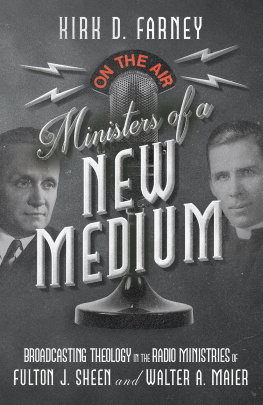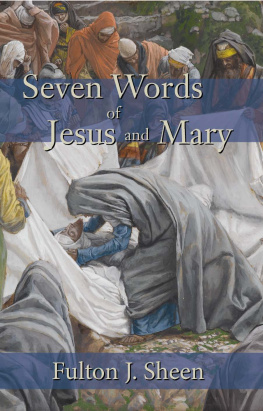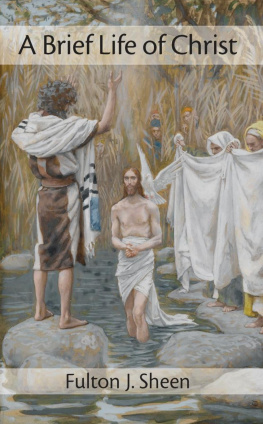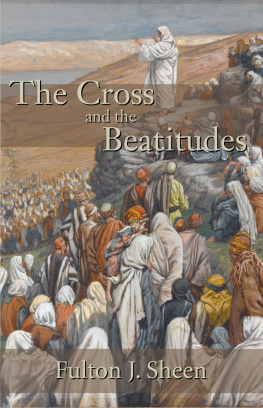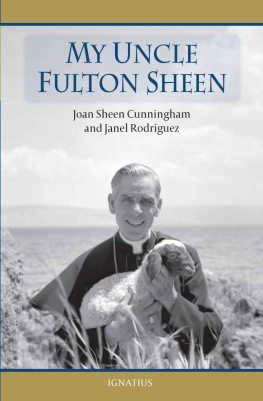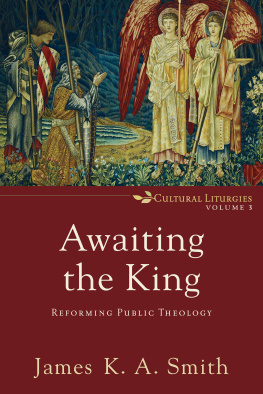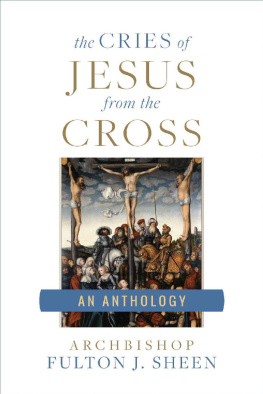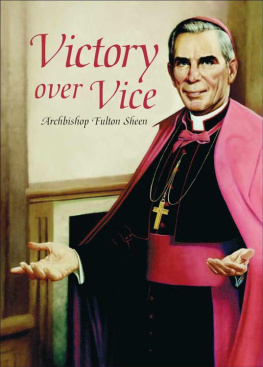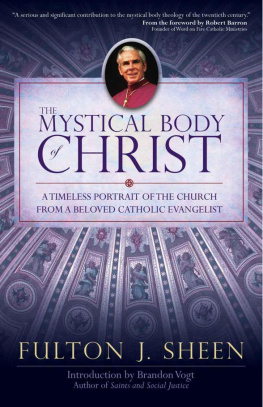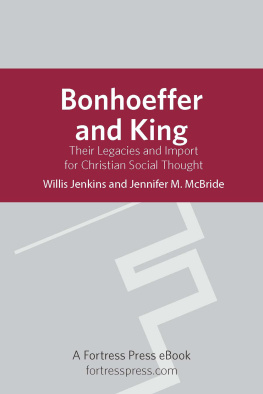Copyright 2019 University of Pennsylvania Press
All rights reserved.
Except for brief quotations used for purposes of review or scholarly citation, none of this book may be reproduced in any form by any means without written permission from the publisher.
Published by
University of Pennsylvania Press
Philadelphia, Pennsylvania 19104-4112
www.upenn.edu/pennpress
Printed in the United States of America
on acid-free paper
1 3 5 7 9 10 8 6 4 2
Library of Congress Cataloging-in-Publication Data
Names: Patterson, James M. (James McGill), author.
Title: Religion in the public square: Sheen, King, Falwell / James M. Patterson.
Description: 1st edition. | Philadelphia: University of Pennsylvania Press, [2019] | Includes bibliographical references and index.
Identifiers: LCCN 2018045748 | ISBN 9780812250985 (hardcover)
Subjects: LCSH: Christianity and politicsUnited StatesHistory20th century. | Church and stateUnited StatesHistory20th century. | Sheen, Fulton J. (Fulton John), 18951979. | King, Martin Luther, Jr., 19291968. | Falwell, Jerry. | United StatesPolitics and government20th century. | United StatesReligionHistory20th century.
Classification: LCC BR526.P375 2019 | DDC 261.70973/0904dc23
LC record available at https://lccn.loc.gov/2018045748
Therefore, everyone who listens to these words of mine and acts on them will be like a sensible man who built his house on rock.
Rain came down, floods rose, gales blew and hurled themselves against that house, and it did not fall: it was founded on rock.
Matthew 7:2425
During the early years of the twentieth century, a Judeo-Christian consensus formed the foundation for public discourse in the United States. At first, remnants of the old Protestant hegemony resisted integration of Catholics and Jews, but after the Second World War the new consensus had taken root. Catholics, Protestants, and Jews sought a shared dogma from which citizens could draw when debating political issues. Not only was it necessary that this dogma satisfy three faiths, it also had to square with the liberal principles of the Declaration of Independence and Constitution. The dogma of the Judeo-Christian consensus changed over time, and it was the priests, bishops, pastors, reverends, and rabbis who negotiated these changes and brought them to their congregations. When a new, more radical generation of secular progressives emerged during the late 1960s and advocated for the liberation of and equal respect for repressed groups, religious leaders continued to insist on the close tie between an adherence to a religious faith and the preservation of a free country. The prevailing view among those leading the Judeo-Christian consensus was that its tie to American liberalism required defending and, over time, such a defense would succeed. Thus began the Culture War.
During the Culture War from the 1980s until the recent years, generations of defenders of the Judeo-Christian consensus made their stand, but at present the ranks are thinner and less certain. At the same time, their old secular,
For Deneen, modern conservatism offers no help because conservatism was always a liberal project. Observing the state of conservative politics, he pronounces, The dying gasps of a conservative reaction to that disassembling [of preliberal institutions] only accelerated liberalisms self-destructionincluding the demise of a conservatism that by its nature could not conserve.
Deneens position has two problems. First, Deneen stresses the agency of liberalism as a concept always lurking behind the scenes, usually invisible and becoming visible only when its deformations are... too obvious to ignore.must introduce them, defend them, and revise laws and norms according to them. Second, because Deneen mistakenly identifies ideas as agents, he condemns the ideas as if they were guilty of crimes, and he strangely exonerates liberal political actors as hostages to an ideological false consciousness.
Political actors are agents for ideas, and their agency is freely chosen, if not always free from external constraints. Chief among these political actors are the American clergy (who, oddly, receive no attention in Deneens recent work), and since the founding of the United States many among them sought to limit the power of the state and redirect it to what they regarded as its proper moral ends and its proper limits in achieving those ends. One critical decision the clergy have tried and too often failed to avoid was affiliating their faiths with a political party, since such a decision would then premise the success of the faith on the capricious outcomes of electoral politics. By the 1990s, however, leading members of clergy had declared their affiliation with the New Conservative Movement and its avatar the Republican Party. The GOP thereby increasingly became the party of religious conservatives as the Democratic Party began to become more secularexcept for its African American Protestants. As a result, these churches then began to decline as existing and potential congregants regarded them merely as political entities instead of anchors of a local community, a source for human salvation, or a tradition connecting generations past, present, and future to the divine. Hence, Deneens general idea of liberalism conceals more than it explains. Specifically, it conceals the political decisions that have led to so deep and numerous divisions over faith in American life. American churches, first among the pre-liberal institutions on which American liberalism depends, ceased to operate as independent, indirect influences on citizens and, instead, lowered themselves to merely ordinary political factions seeking to work their ministry through state coercion instead of grace or tradition. Liberalism is not the cause of the problems Deneen observes, since ideas lack agency. Rather, one of the most important defenses against the excesses of American liberalism, religious institutions, failed to remain independent of politics. In short, liberalism did not fail the church; the church failed liberalism.
To make this case, this book offers two claims. First, ideas make their way to the public by way of popularizers, and these popularizers have very often been clergy. Second, to remain persuasive to the public, clergy must focus their efforts on moral and religious education rather than direct participation in government or political parties.
While a small number of thinkers might do the difficult work of developing philosophies of life, a second, middle tier connects the thinkers and the people at large. Between these two worlds were popularizers that sought to connect the two groups, but it is wrong to regard popularizers as somehow merely derivative or pandering. The genius of the popularizer is in rendering difficult ideas into simple tenets with direct relevance to the everyday lives of regular people and, at the same time, elevating these everyday lives by joining them to a higher purpose than mere material consumption. During the twentieth century, many of these figures were members of clergy who sought to link their specific ideas about faith to a diverse religious population. Hence, they took for granted this diversity and sought to develop a consensus that satisfies the members of the several faiths. This consensus rested on a dogma, or a set of assumptions out of which popularizers could build arguments for ethical and political reform, and the consensus would remain robust if clergy generally understood their responsibility to be the preservation of its terms through persuasion, conversion, and tradition.


